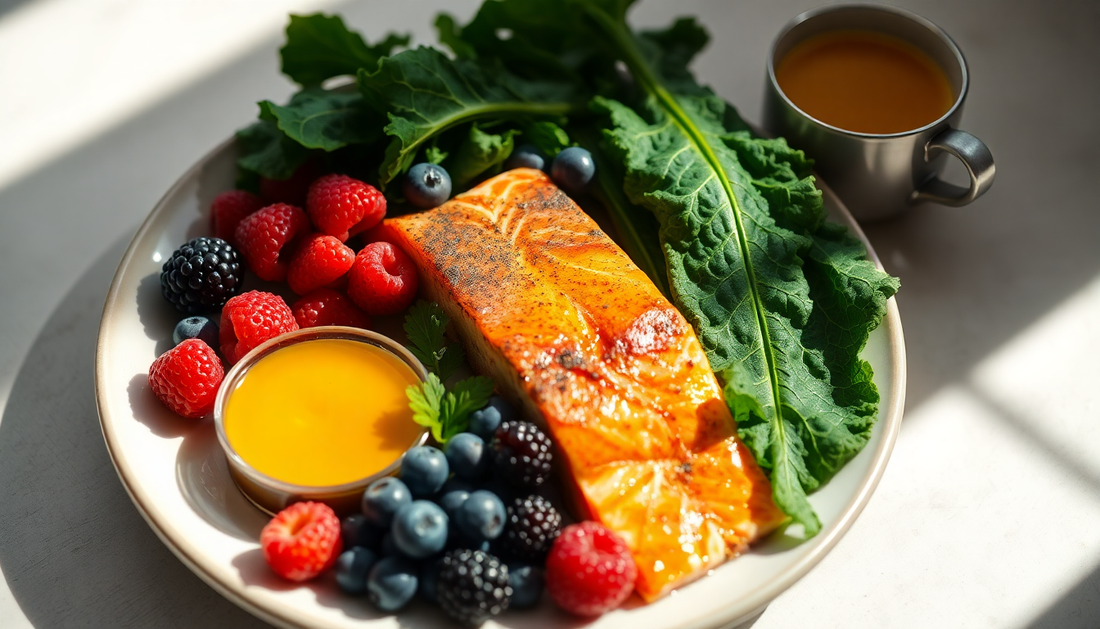
Anti-Inflammatory Eating for Post-Bariatric Patients: Reducing Surgical Recovery Time
Share
🔬 Understanding Inflammation After Bariatric Surgery
Bariatric surgery, including procedures like sleeve gastrectomy and gastric bypass, triggers a normal inflammatory response as tissues begin healing. However, persistent inflammation can delay recovery, impair immune response, and increase the risk of post-operative complications (Cleveland Clinic, 2022).
Chronic low-grade inflammation is common in obesity and can persist after surgery if not managed. Nutritional strategies that support tissue repair and modulate inflammation are key for enhanced recovery and long-term wellness (NIH, 2020).
🥦 The Power of Anti-Inflammatory Eating
Anti-inflammatory diets emphasize whole, nutrient-dense foods rich in antioxidants, omega-3s, fiber, and phytonutrients. These foods downregulate pro-inflammatory cytokines and oxidative stress markers, promoting faster healing and immune balance (Harvard Health, 2021).
🧭 Core Principles:
- Focus on lean proteins (chicken, tofu, legumes).
- Prioritize omega-3-rich sources (salmon, chia, walnuts).
- Include colorful fruits and vegetables for antioxidant support.
- Add anti-inflammatory spices (turmeric, ginger, garlic).
- Avoid ultra-processed foods and trans fats.
🥗 Best Anti-Inflammatory Foods for Bariatric Recovery
🐟 Lean Proteins
Aid in wound healing and muscle repair. Options like turkey, fish, eggs, and lentils are easy to digest and promote satiety (Academy of Nutrition and Dietetics, 2023).
🧬 Omega-3 Fatty Acids
Reduce pro-inflammatory eicosanoids. Found in salmon, flaxseeds, sardines, walnuts, and chia seeds. Omega-3s also support cognitive function during recovery (BMJ, 2017).
🫐 Antioxidant-Rich Fruits and Vegetables
Berries, spinach, kale, broccoli, and bell peppers neutralize oxidative stress and support immune response (Nutrition Reviews, 2019).
🌿 Anti-Inflammatory Spices
- Turmeric (curcumin) has anti-inflammatory and antioxidant properties (JAMA, 2018).
- Ginger and cinnamon may reduce C-reactive protein and other inflammatory markers.
🧑🍳 Sample Anti-Inflammatory Meal Plan
Mon
Spinach & feta scrambled eggs
Grilled salmon, sweet potato, broccoli
Lentil soup + side salad
Tue
Greek yogurt with berries & chia
Chicken-avocado lettuce wraps
Baked cod + quinoa + Brussels sprouts
Wed
Chia pudding w/ almonds
Turkey stir-fry + brown rice
Chicken kebabs + roasted asparagus
Thu
Egg muffins (spinach, peppers)
Tuna salad + mixed greens
Tofu + steamed broccoli + sweet potato
Fri
Oatmeal + walnuts + blueberries
Shrimp skewers + roasted zucchini
Veggie-bean chili + whole grain crackers
👉 Adjust for portion tolerance and macro goals post-surgery.
⚠️ Nutrient Absorption Considerations After Surgery
Bariatric procedures alter the stomach and intestines, limiting absorption of key nutrients. This may exacerbate inflammation if left unchecked.
💡 Tips for Enhancing Absorption:
- Pair fat-soluble vitamins (A, D, E, K) with healthy fats (olive oil, avocado).
- Choose easily digestible proteins (tofu, fish, eggs).
- Use chewable or liquid multivitamins designed for bariatric patients (ASMBS, 2020).
💊 Supplements to Support Post-Op Inflammation Control
🎯 Key Vitamins & Minerals:
- Vitamin D: Deficiency common post-op and linked to higher inflammation risk (NIH, 2021).
- Vitamin B12: Needed for red blood cell production and neurological recovery.
- Iron and Calcium: Frequently deficient after gastric bypass or sleeve.
🧘 Anti-Inflammatory Supplements:
- Omega-3 Fish Oil: Reduces C-reactive protein and IL-6 levels.
- Curcumin (from turmeric): Inhibits inflammatory enzymes.
- Ginger Extract: Modulates immune signaling and eases nausea.
Always consult a dietitian or bariatric care provider before starting supplements.
🧘 Lifestyle Habits That Complement Anti-Inflammatory Eating
💧 Hydration
Water flushes toxins, supports circulation, and keeps tissues supple.
😴 Rest and Sleep
Sleep is anti-inflammatory by nature. Aim for 7–9 hours of quality rest.
🧘 Stress Management
Mindfulness, yoga, and journaling lower cortisol and inflammation markers (Mayo Clinic, 2023).
🔍 Monitoring Progress
Check for signs of healing:
- Less swelling and redness
- More energy and mobility
- Fewer gastrointestinal symptoms
- Improved lab markers (CRP, vitamin D, ferritin)
If inflammation persists, consult your medical team for lab testing or plan adjustments.
🧭 Conclusion
An anti-inflammatory diet is not just about what you eat—it’s a holistic recovery tool. By focusing on nutrient-dense foods, mindful habits, and science-backed supplements, you support not only healing but long-term metabolic health after bariatric surgery.
Harness the power of food as medicine. Your body is healing. Let your nutrition be the ally that makes the journey smoother, faster, and more sustainable.
🩺 Medical Disclaimer
This content is for educational purposes only and is not a substitute for professional medical advice. Always consult your bariatric care team before making changes to your diet or supplement routine.
